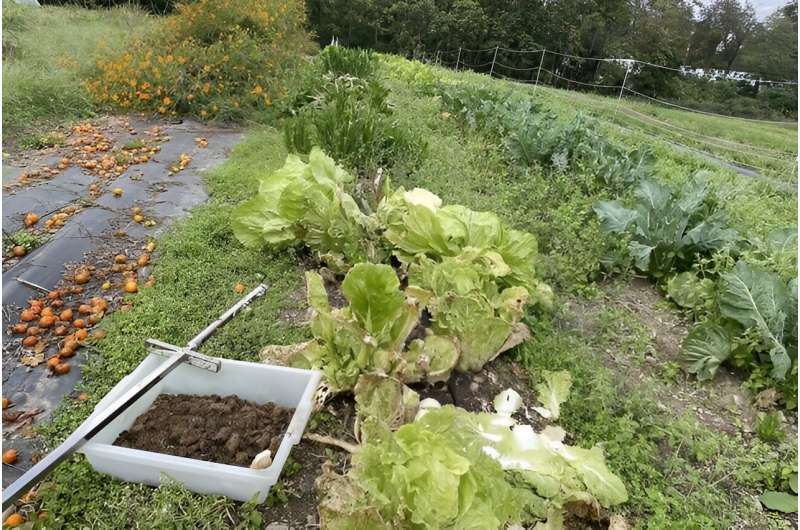This article has been reviewed according to Science X's editorial process and policies. Editors have highlighted the following attributes while ensuring the content's credibility:
fact-checked
trusted source
proofread
Organic farmers' beliefs about soil microbiome affect their practices, study shows

Organic farming can support soil microorganisms that promote plant defenses and reduce insect pests. But not all organic practices are equally beneficial for soil microbes, and it's important to understand farmer motivations in order to encourage the adoption of microbiome-supportive efforts.
A new study from the University of Illinois Urbana-Champaign and Cornell University looks at how organic farmers' beliefs about the microbiome influence their soil management practices. The research is published in the journal Renewable Agriculture and Food Systems.
"There is very little research on what farmers think about the soil microbiome and what it means for which agricultural practices they adopt. In the long run, we want to understand organic farmers' incentives to adopt microbiome-friendly practices from an economic perspective," said co-author Shadi Atallah, associate professor in the Department of Agricultural and Consumer Economics, part of the College of Agricultural, Consumer and Environmental Sciences (ACES) at Illinois.
The researchers surveyed 85 organic vegetable farmers in New York, gauging their microbiome beliefs, farming practices, and motivations. The farmers were also asked to provide soil samples from their fields.
The survey included a brief explanation of the interaction of soil microbes and plant defenses. Then, farmers were asked to indicate their agreement with a series of statements about factors that influence the soil microbiome, including on-farm practices such as no-till, cover cropping, or mulches; farm characteristics; external factors from bordering lands; and climate events.
"Overall, 96% of the farmers believed that the microbiome on their farm is influencing plant defenses and pest suppression. But there was much more variety in their beliefs about what factors promote a healthy microbiome," said lead author Elias Bloom, postdoctoral research associate at Cornell.
The researchers identified seven belief clusters, based on the farmers' agreement with the microbiome impact of on-farm practices, external factors, or a combination of those.
"We found that farmers who believed on-farm practices such as no-till or cover crops are important for influencing the microbiome also tended to adopt those practices. These beliefs are consistent with what the literature indicates are the preferred practices to support the microbiome," Bloom said.
The researchers also looked at demographic characteristics such as farm size and farmer's age and how that influenced the adoption of practices.
"For example, larger farms tend to be less diversified and less likely to adopt no-till and biological mulches. To promote these ecosystem benefits, researchers need to think about how to bring no-tillage and diversified crop production to a larger scale so they can be more manageable for larger farms," Bloom stated.
If Extension services and land management agencies have a goal of encouraging farmers to maximize investments in the soil microbiome, it's important to know how to target messages, Atallah said. Beliefs can be hard to measure, while socio-economic characteristics are more directly observable, so there is an opportunity to use these characteristics as a proxy for beliefs.
The authors caution demographic variables did not fully predict the adoption of farming practices. They said it's important to examine beliefs in order to fully understand farmer motivations.
"There's another important and exciting part of the study, which we will explore in the next steps," said co-author Clare Casteel, associate professor in the School of Integrated Plant Science at Cornell. "We've also collected soil samples from all these farmers across the sites. We're actually going to measure changes in the microbiome and link biology to the understanding of economics and current beliefs."
Atallah noted this is an exploratory study focusing on a sample of organic farmers in New York, a state where organic farming is thriving. It doesn't allow for conclusions on a national scale, but the work can inform future research on microbiome-friendly practices.
"Understanding why different farmers might select different practices based on what they believe about the microbiome is a first step to understanding how to incentivize certain kinds of organic practices. Eventually, there could be market incentives such as a microbiome-friendly ecolabel on food," he added.
Bloom noted the work also relates to connections between the soil microbe and human health.
"What you put into your body influences your gut microbiome and your health. Similarly, what you put into your farm influences your soil microbiome and the health of your crops. There are important parallels between our work in organic agriculture and the soil microbiome to a broader interest in the public about the microbiome in general and how it influences all parts of our lives. We're still just at the beginning of understanding how it all fits together in humans and within farming systems."
More information: Elias H. Bloom et al, Motivating organic farmers to adopt practices that support the pest-suppressive microbiome relies on understanding their beliefs, Renewable Agriculture and Food Systems (2024). DOI: 10.1017/S174217052400005X
Provided by University of Illinois at Urbana-Champaign





















